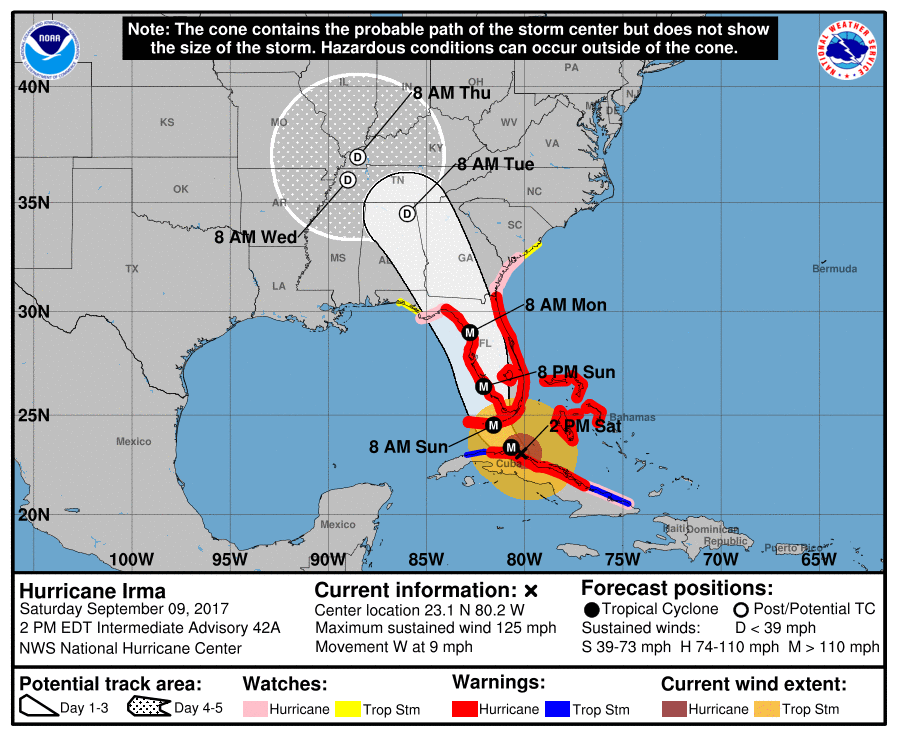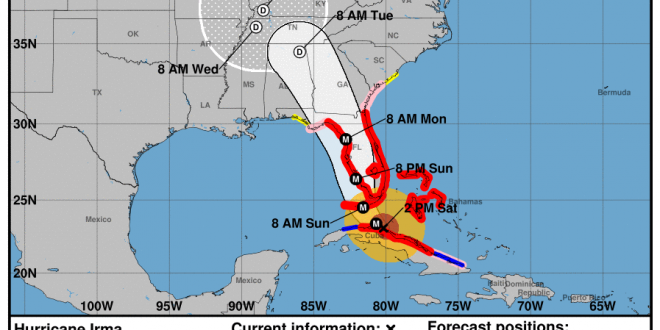On Sept. 9, 2017 at 2 p.m. the National Weather Service released new predictions that show Hurricane Irma set to make landfall north of Naples, Florida early Sunday morning. This is after the storm passes over Key West, Florida and could potentially make landfall as a category 4 or even a category 5 hurricane over Key West. It is expected that winds at this time will exceed 110 mph.
The storm is on track to move into Southeast Georgia on Monday morning a few hours before noon. Orlando, Florida is expected to be covered by Hurricane Irma on Sunday evening near 8 p.m. The center of the hurricane is predicted to reach Valdosta around 2 p.m. Winds could reach 80 mph during this time with gusts of over 100 mph.
Valdosta will begin to feel effects from the outer bands of Hurricane Irma Sunday. Expect rain to begin at 7 a.m. on Sunday Morning and winds to be around 15 mph throughout the day. Wind and rain will be constant throughout Sunday as Hurricane Irma travels closer to the Georgia-Florida border.
Winds are expected to be 45 mph at 3 a.m. on Monday morning. These will increase much higher as the hurricane wall moves closer to Valdosta, Georgia.
Today is the last day to prepare for the storms due to the high chance of rain and heavy winds tomorrow.
Cities in South Florida such as Miami are already experiencing severe weather from the outer bands of Hurricane Irma.
Moody Air Force Base has announced that it will be closed due to Hurricane Irma. Please stay off of the roads tomorrow evening and Monday.
The hurricane is still currently located in the ocean between Florida and Cuba and continues to grow stronger as it travels in the direction of the continental United States. Predictions currently suggest that the eye of the hurricane is growing stronger as it moves over the water. Due to the size of Hurricane Irma, it is possible that while it’s moving over Florida it will struggle to lose strength because of the heat from the Atlantic Ocean and the Gulf of Mexico. The water on the eastern and western sides of the storm will also keep it from shrinking.
The eastern side of a hurricane tends to feature the most instances of tornadoes. Please be aware of this as you are looking at the forecasted tracks. Valdosta is located on the eastern side of the hurricane in the most recent prediction track. Valdosta residents should anticipate tornadoes and severe winds.
If you are a student remaining on campus during Hurricane Irma please stay informed on precautions and safety guidance before, during and after the storm. RA’s in each dorm hall will be providing information to keep those staying on campus safe. All students that live on VSU campus must complete the Hurricane Housing survey.
For those who are off campus and are in or around the projected path of the hurricane, prepare your supplies before Monday. The hurricane is expected to begin impacting the Lowndes County area Monday morning at 10 a.m. Tropical Storm force winds are expected in Valdosta and the surrounding areas during the first interaction with Hurricane Irma.
Power outages are expected. Please plan accordingly.
Make sure that your household has a plan for when disaster strikes if you are not evacuating ahead of time. This includes, but is not limited to, placing any stray items that are currently outside into your home or garage, clear off any front or back porches such as chairs and tables, and, if possible, park your cars inside of a garage or under a stable covering. Winds are expected to be the most extreme part of our interactions with Hurricane Irma, so treat this storm as you would treat a tornado watch/warning. Today is the last full day to safely prepare for the upcoming weather.
The National Weather Service advises you stay in a room that is centralized in your home and that has no windows, on the lowest level of the house, if possible. This is the safest location to be in during times of severe winds. Fill bottles with water in the event that water treatment facilities become inoperable and keep shelf-stable foods near in the event that power is shut off and you are not able to cook or use your fridge. If power does shut off, try to keep your fridge door shut, as this will help to preserve the food that is inside and will keep the cold in for as long as possible. A battery operated emergency radio can be useful too if the power is not working.
Stay safe and try to keep your phones charged going into the storm just in case the power is out for an extended amount of time.
The Spectator will continue to relay all information that is provided by the National Weather Service and local authorities regarding Hurricane Irma.
Follow us on social media for more updates on Hurricane Irma.



Story by Seth Willard. Photos by the National Weather Service and the Weather Channel.
 The Spectator The independent student newspaper of Valdosta State University
The Spectator The independent student newspaper of Valdosta State University







